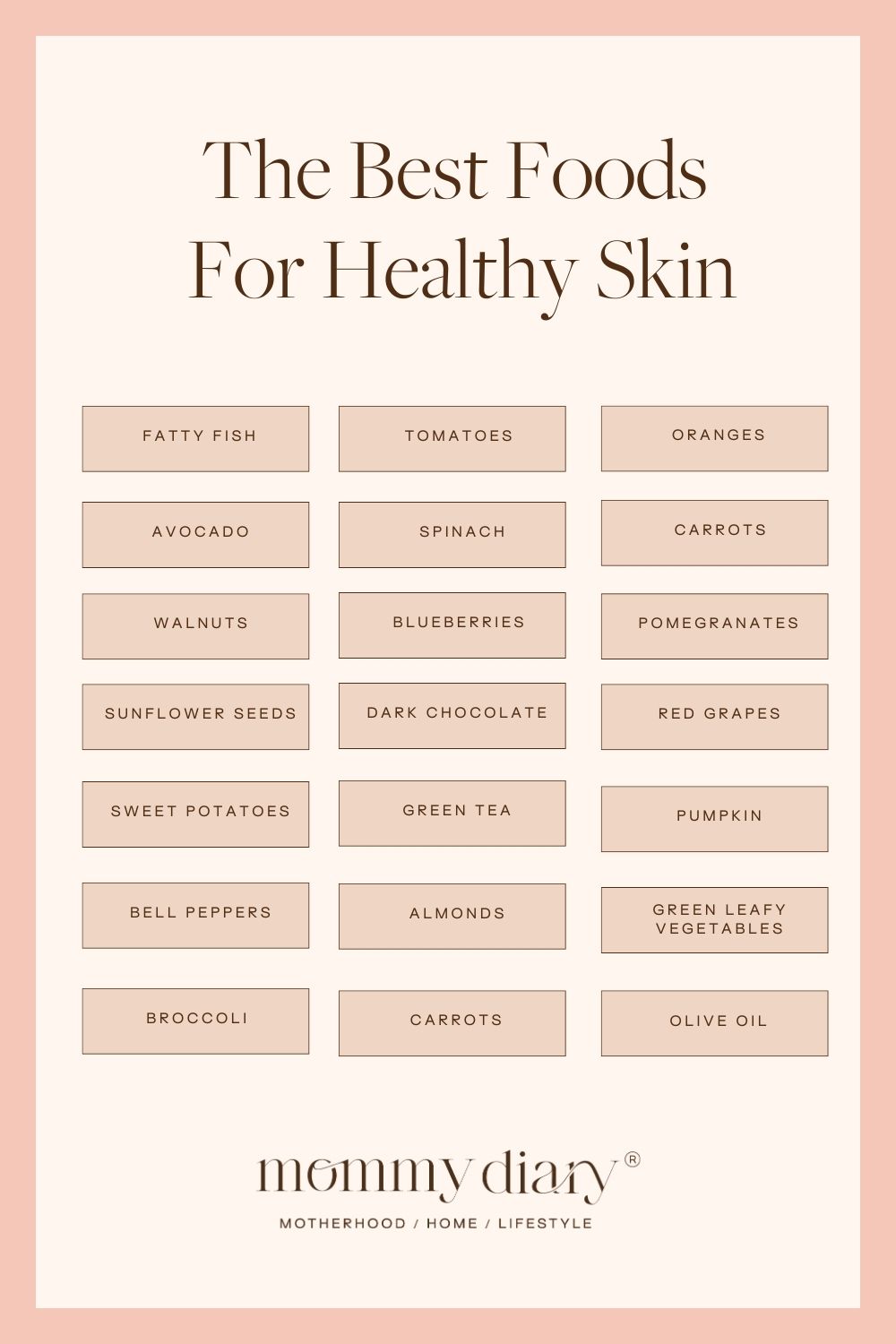Good skin care is essential for your overall health and well-being. Every day, our skin faces a barrage of environmental assaults such as sun exposure, wind, cold temperatures, air pollution, and irritants like soaps, makeup, and hair products.
As someone who understands the importance of taking good care of your skin, I know that nourishing it from the inside out is one of the most effective ways of keeping it healthy, soft, and blemish-free. I also know that as moms, we need all the help we can get and with all our other duties – it’s hard to make time for the self-care we need!
Over the years, I’ve learned that a steady supply of vitamins and nutrients can give your skin cells a healthy boost, delay the signs of skin aging, and prevent skin problems. That’s why, today, I want to share with you various tips that can help feed the skin from within, as well as the best foods for healthy skin.

How To Feed Your Skin
Use sunscreen to protect your skin
Protecting your skin from the harmful effects of the sun is one of the best things you can do for your skin health. Exposure to ultraviolet radiation can lead to skin cancer, premature aging, dry skin, and other skin problems. Make sure to apply sunscreen with at least SPF 30 every day, even when it’s cloudy and even when you’re indoors, and reapply every two hours if you’re outside for a long time. You can read more about sun protection here.
My favorite sunscreens to use include Supergoop! Unseen Sunscreen, Coola Organic Sunscreen, and Mustela Baby Mineral Sunscreen for my children.
Apply antioxidants for healthy skin
To maintain healthy skin, it’s important to protect it from free radicals, which can cause wrinkles, age spots, and other signs of aging. Antioxidants are potent nutrients that can help neutralize free radicals, and some good dietary sources of antioxidants include green tea, dark chocolate, and fruits and vegetables. Additionally, applying a serum or cream that contains antioxidants can provide nourishment and protection to your skin from the outside. This K-Beauty serum by Innisfree is rich in antioxidants and restores the skin’s natural moisture barrier. I also recommend the TIRTIR Rosemary Serum and the LA PURE Korean Face Mask for your skin’s daily dose of antioxidants.
Stay hydrated for skin health
Drinking enough water is crucial for keeping your skin hydrated and healthy. When you’re dehydrated, your skin can become dry, flaky, and prone to wrinkles. Aim to drink at least eight glasses of water daily, and more if you’re active or in a dry environment. You can also eat water-rich foods like cucumbers, watermelon, and tomatoes.
Did you know that having a designated water bottle can help you drink more water throughout the day? It’s true! Try this glass water bottle or this collapsible water bottle (perfect for travel) to get started, or grab this half-gallon hydro flask to reduce refills.
Eat a healthy skin diet
Studies show that a healthy, balanced diet is essential for skin health. Foods rich in omega-3 fatty acids, such as fatty fish and walnuts, can help reduce inflammation and keep your skin supple. Foods rich in beta carotene, such as sweet potatoes and bell peppers, can help protect your skin from sun damage. And, foods rich in vitamin C, such as broccoli and oranges, can help boost collagen production and prevent wrinkles.
Treat your skin gently
Harsh soaps, hot water, and scrubbing too hard can damage your skin and strip it of its natural oils. To keep your skin healthy, use gentle cleansers, lukewarm water, and pat your skin dry instead of rubbing it. Also, avoid picking at pimples or touching your face too much, which can spread bacteria and cause breakouts.

The Best Foods For Healthy Skin
Now, let’s talk about some of the best foods you can eat to nourish your skin from the inside out. Including these foods in your diet can provide your skin with the essential vitamins and nutrients it needs to maintain a healthy glow.
Fatty Fish
Fish like salmon, mackerel, and tuna are high in omega-3 fatty acids, which can help reduce inflammation and keep skin hydrated. Aim to consume at least two servings of fatty fish per week. For a healthier dinner option, you can incorporate fatty fish like salmon, mackerel, and tuna into your diet by grilling or baking them. You can also use canned salmon or tuna in sandwiches, salads, and wraps.
Avocado
This delicious fruit is rich in healthy fats and vitamin E. Avocado helps to protect your skin from damage caused by free radicals. Add avocado to salads, smoothies or use it as a healthy substitute for butter or mayo.
Walnuts
These nuts are an excellent source of omega-3 fatty acids and vitamin E, which can improve skin health. You can add walnuts to an oatmeal, or yogurt or eat them as a snack. Check out my yummy chia seed and walnut overnight oats recipe to get started.
Sunflower Seeds
Sunflower seeds are packed with nutrients like vitamin E, zinc, and selenium, and they can help protect your skin from damage and promote healthy skin growth. Sprinkle sunflower seeds on salads, soups or eat them as a snack.
Sweet Potatoes
Sweet potatoes are rich in beta-carotene, a powerful antioxidant that can help protect your skin from sun damage and improve skin hydration. You can roast sweet potatoes, mash them, or add them to soups and stews.
Bell Peppers
Bell peppers are an excellent source of vitamin C, essential for collagen production and skin health. Add bell peppers to salads, stir-fries, or eat them raw as a snack.
Broccoli
This cruciferous vegetable is rich in vitamins A and C. These vitamins help improve skin texture and reduce inflammation. You can steam broccoli, roast it, or add it to soups and salads.
Tomatoes
Tomatoes are a good source of vitamin C, known to help boost collagen production and protect your skin from sun damage. You can add tomatoes to salads, sandwiches, or chili—this is one of my favorite instant pot chili recipes.
Spinach
Spinach is rich in antioxidants like vitamin C and beta-carotene to help protect your skin from damage and improve skin hydration. I enjoy adding spinach to smoothies and omelets or using it as a base for salads.
Blueberries
These little berries are rich in antioxidants and can help protect your skin from damage caused by free radicals. You can add blueberries to smoothies, oatmeal or eat them as a snack.
Dark Chocolate
Dark chocolate is rich in flavonoids, which can help improve blood flow to the skin and protect it from sun damage. Aim to consume dark chocolate with at least 70% cocoa content. Choose to snack on it, add it to smoothies, or bake with it.
Green Tea
Green tea is rich in polyphenols to help protect your skin from damage caused by UV radiation. You can drink green tea hot or cold, and add lemon or honey for flavor.
Almonds
Almonds are an excellent source of vitamin E. This vitamin helps protect your skin from damage and improves skin hydration. Enjoy almonds as a snack, add them to salads, or use almond butter as a healthy spread.
Carrots
Carrots are rich in beta-carotene, a nutrient that helps protect your skin from sun damage and improves skin hydration. Serve carrots raw, roast them, or add them to soups, stir-fries, and stews. I enjoy making smoothies out of them too. Here is one of my favorite healthy juice recipes you can make right at home.
Oranges
Oranges are rich in vitamin C, which can help boost collagen production and protect your skin from sun damage. You can eat oranges as a snack or add them to smoothies.
Pomegranates
Pomegranates are another good source of antioxidants, specifically ellagic acid. This acid helps protect the skin from sun damage and improves skin hydration. You can choose to eat these plain as a snack or add to salads, or use them as a topping sprinkled over oatmeal or yogurt.
Red grapes
Red grapes are packed with resveratrol, a potent antioxidant shown to have anti-inflammatory and anti-cancer properties. You can add red grapes to salads, smoothies or have them as a stand-alone snack.
Pumpkin
I love pumpkins. They are a good source of beta-carotene and vitamin E, which can help protect the skin from sun damage and improve skin health. Pumpkins can be roasted or used in soups, stews, or muffins.
Green leafy vegetables
Dark leafy greens such as kale, collard greens, and spinach, are rich in vitamins A and C, as well as other antioxidants. All of which help protect the skin from free radical damage and improve collagen production. They can be added to salads, smoothies, or omelets, and they can also be sautéed as a side dish with a little seasoning.
Olive oil
Olive oil is a good source of monounsaturated fatty acids and polyphenols to help improve skin hydration and protect the skin from free radical damage. It can be used as a healthy cooking oil or as a salad dressing. I also enjoy using it as a dip for bread or veggies.

Taking care of your skin from the inside out is crucial for maintaining healthy and youthful-looking skin.
By incorporating various nutrient-rich foods into your diet, you can help support your skin’s health and prevent skin problems. Additionally, protecting your skin from the sun, staying hydrated, and being gentle when caring for your skin can help maintain its health and vitality.
By following these simple lifestyle changes, you can achieve healthy, radiant skin that will not only look great but also feel great. Remember that every person’s skin is unique, and it’s important to listen to your skin’s needs and adjust your diet and skincare habits accordingly. With consistent and mindful care, you can enjoy healthy and beautiful skin for years.
For more on skincare, check out my previous posts on Skincare for Busy Moms and the All Mask, No Mess Mask from Olay. I also highly recommend checking out these Asian Owned Skincare Brands I love to support.
Do you have any tips for feeding your skin? Drop your skincare secrets below!

